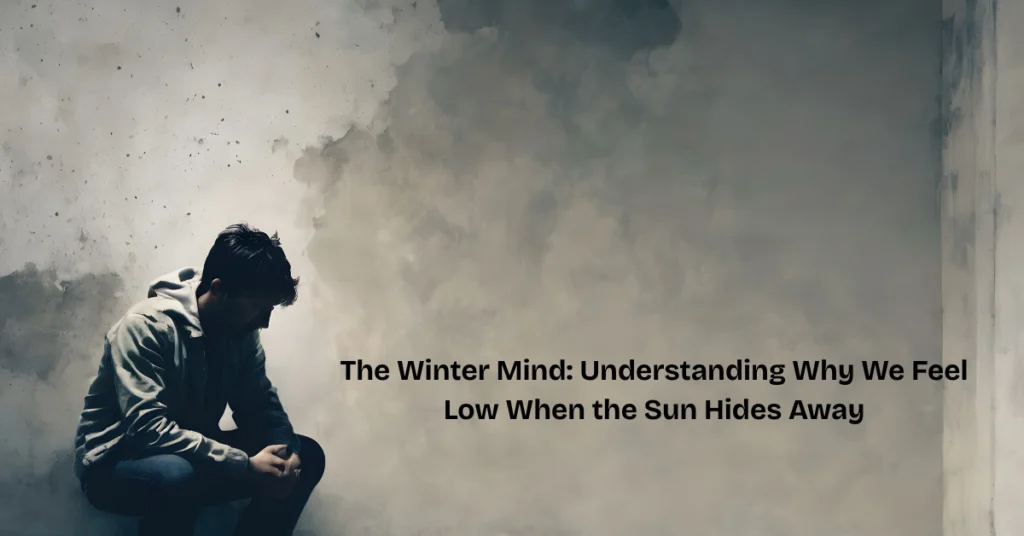As winter descends, many people find their mood shifting in subtle yet noticeable ways. The joy and activity of summer seem to fade into a quieter, heavier emotional landscape. Some feel more tired, others lose motivation or interest in socializing, and many describe a vague sense of loneliness that wasn’t there before. While these feelings are often dismissed as “winter blues,” science shows that there are clear biological and psychological reasons behind them.
1. The Role of Sunlight and Circadian Rhythm
One of the most significant causes of winter-related mood changes is reduced sunlight exposure. Sunlight plays a crucial role in regulating the circadian rhythm — our body’s internal 24-hour clock that influences sleep, hormones, and mood.
During winter, the days are shorter and the intensity of natural light decreases. This limited exposure affects the brain’s suprachiasmatic nucleus (SCN), the region responsible for synchronizing the circadian rhythm. As a result, sleep cycles can become irregular, energy levels drop, and people may feel more lethargic and emotionally flat.
Moreover, less sunlight means less stimulation of the retina — which affects how much serotonin (the “feel-good” neurotransmitter) is produced. Lower serotonin levels are closely linked with symptoms of depression and anxiety.

2. Melatonin and Sleep Regulation
Alongside serotonin, the hormone melatonin also plays a vital role in winter mood regulation. Melatonin is responsible for controlling sleep-wake cycles, and its production increases when it’s dark.
In winter, because of longer nights and dimmer days, melatonin levels often remain elevated for extended periods. This hormonal imbalance makes people feel drowsier, less alert, and more withdrawn. Essentially, the body starts functioning as though it’s in a semi-hibernation mode — conserving energy but also reducing emotional responsiveness.
3. Vitamin D Deficiency and Brain Chemistry
Sunlight is the body’s primary source of vitamin D, which is essential for healthy brain function and the regulation of mood-related neurotransmitters. In winter, limited sunlight exposure can lead to a drop in vitamin D levels.
Low vitamin D affects the production of serotonin and dopamine, both of which are critical for maintaining positive mood and motivation. Studies have shown that people with low vitamin D are more likely to experience Seasonal Affective Disorder (SAD) — a recurrent depressive condition that typically appears in late autumn and improves with the return of spring sunlight.
4. Reduced Physical and Social Activity
Cold weather naturally discourages outdoor movement and social interaction. Physical activity boosts endorphins, which act as natural antidepressants, while social connections provide emotional stimulation. During winter, the combination of reduced movement and isolation leads to a double deficit — a decrease in both biological and psychological sources of happiness.
Additionally, shorter daylight hours often result in people spending more time indoors on screens, which can further disrupt sleep cycles and contribute to feelings of disconnection.
5. Psychological and Emotional Factors
Winter also influences emotional processing. Humans are sensitive to environmental cues — gray skies, silence, and cold surroundings subconsciously signal withdrawal and introspection. For individuals already prone to anxiety or loneliness, this internal focus can intensify negative thought patterns.
The end of the year can also act as a psychological checkpoint, prompting reflection on goals, relationships, and losses. This introspection, though valuable, can lead to feelings of sadness or inadequacy if one’s expectations haven’t been met.
6. Gender Differences in Seasonal Mood Changes
Research indicates that women are more likely than men to experience seasonal mood shifts or SAD. Hormonal fluctuations, particularly involving estrogen and serotonin sensitivity, may amplify the emotional effects of reduced sunlight.
Men also experience mood dips in winter, but they often manifest as irritability, fatigue, or loss of motivation rather than sadness.
7. Managing Winter Low Mood
The good news is that winter-related mood changes are both recognizable and manageable. Some scientifically supported approaches include:
-
Light therapy: Exposure to a bright light box for 20–30 minutes daily mimics natural sunlight and helps reset circadian rhythm.
-
Physical activity: Regular exercise boosts serotonin and endorphin levels.
-
Vitamin D supplements: These help compensate for reduced sunlight exposure.
-
Structured routines: Maintaining consistent sleep and meal times supports emotional stability.
-
Social engagement: Regular interaction, even virtual, counteracts isolation.
Also Read: Zubeen Da: The Voice That Refused to Fade
While winter brings biological and environmental challenges that can affect mood, it also offers an opportunity for awareness. Understanding the science behind these feelings helps people approach the season with empathy and practical strategies rather than self-blame. By aligning daily habits with our body’s natural rhythms — ensuring light, movement, nutrition, and connection — we can transform winter from a season of loneliness into one of quiet restoration.



